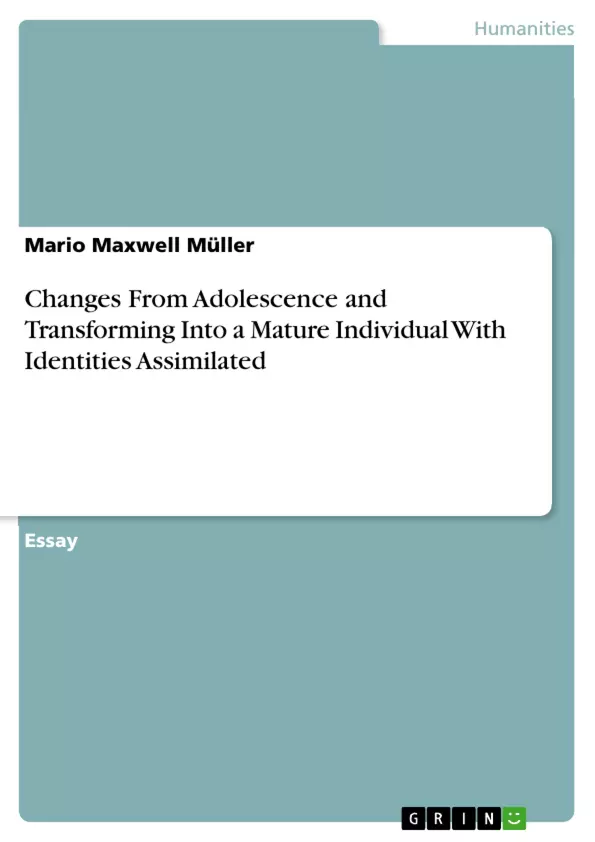The following essay will discuss the importance of adolescent development within an international school setting. The norms within an International Baccalaureate school are given that teachers and educators are trained accordingly to the needs as outlined by the International Baccalaureate organisation, where a focus is placed on inquiry-based learning, assessments, student agency, and how to promote international mindedness, allowing students to learn through making connections within a global context while being knowledgeable, caring, risk-takers and open-minded. The essay is divided into three sections, the author's personal experiences transforming from childhood into becoming a teenager with all the social and peer pressures students have to encounter at this age, even being a mature adult and attending University.
Inhaltsverzeichnis (Table of Contents)
- Introduction
- Part 1 - Evolving identities growing up from being a child
- Part 2 - Evolving identity being a teenager
- Part 3 - Evolving identity being a mature adult
- Evaluation of how my identity changes evolved
Zielsetzung und Themenschwerpunkte (Objectives and Key Themes)
This essay aims to discuss the significance of adolescent development within an international school setting, highlighting the norms and practices prevalent in International Baccalaureate schools. The essay explores the author's personal journey of transforming from childhood to adolescence and ultimately becoming a mature individual.
- The impact of identity development during adolescence
- The role of the International Baccalaureate program in shaping students' identities
- The influence of family, peers, and school environment on identity formation
- The importance of responsibility, respect, and resilience in adolescent development
- The challenges and opportunities faced by individuals in navigating adolescence and adulthood
Zusammenfassung der Kapitel (Chapter Summaries)
The essay unfolds through the author's personal reflections on their evolving identity across three distinct stages: childhood, adolescence, and adulthood.
- Introduction: This section establishes the essay's purpose and introduces the author's perspective on adolescent development, emphasizing the importance of self-reflection and evaluation within the International Baccalaureate program.
- Part 1 - Evolving identities growing up from being a child: This part explores the author's early childhood experiences, shaped by a conservative religious background. The author reflects on their upbringing and their early identity as a reserved and responsible child, highlighting the importance of primary school in fostering social skills and values.
- Part 2 - Evolving identity being a teenager: This part delves into the author's adolescent years, marked by a shift from a reserved child to a more rebellious and risk-taking teenager. The author describes the challenges and pressures of fitting in, navigating peer relationships, and balancing personal values with social expectations.
- Part 3 - Evolving identity being a mature adult: This part examines the author's experiences transitioning into adulthood, emphasizing the continued importance of responsibility and resilience while navigating new challenges and opportunities. The author reflects on their journey towards self-discovery and the lasting impact of their upbringing and educational experiences.
Schlüsselwörter (Keywords)
This essay explores the complexities of adolescent development, focusing on key concepts such as identity formation, the International Baccalaureate program, the impact of family and peer influence, and the development of critical life skills like responsibility, respect, and resilience. The author's personal experiences provide insights into the transformative nature of adolescence and the challenges and opportunities that come with navigating the transition to adulthood.
Frequently Asked Questions
How does the International Baccalaureate (IB) program influence student identity?
The IB program shapes identity by focusing on inquiry-based learning, student agency, and international mindedness, encouraging students to be risk-takers, caring, and open-minded within a global context.
What are the key stages of development discussed in the essay?
The essay explores three distinct stages: childhood (shaped by conservative religious background), adolescence (marked by peer pressure and rebellion), and mature adulthood (focused on responsibility and resilience).
What challenges do teenagers face in identity formation?
Teenagers often face social and peer pressures, the challenge of balancing personal values with social expectations, and the transition from being a reserved child to a more independent individual.
Why is self-reflection important in the adolescent journey?
Self-reflection allows individuals to evaluate how their upbringing, educational environment, and social interactions have shaped their values and actions over time.
What role does family play in early identity development?
Family, including religious background and upbringing, provides the initial framework for identity, often fostering traits like reservation and responsibility in early childhood.
- Quote paper
- Mario Maxwell Müller (Author), 2022, Changes From Adolescence and Transforming Into a Mature Individual With Identities Assimilated, Munich, GRIN Verlag, https://www.grin.com/document/1292780



